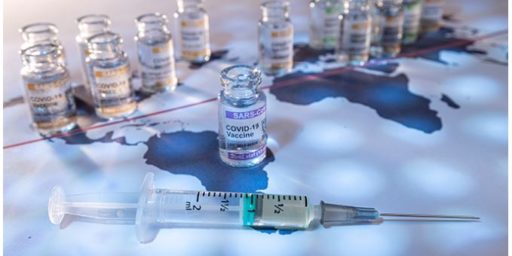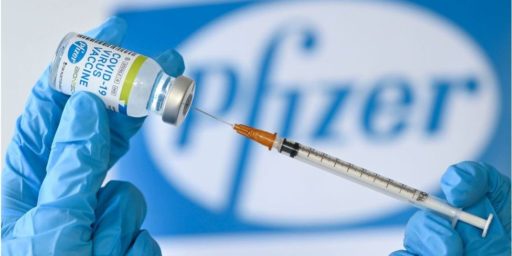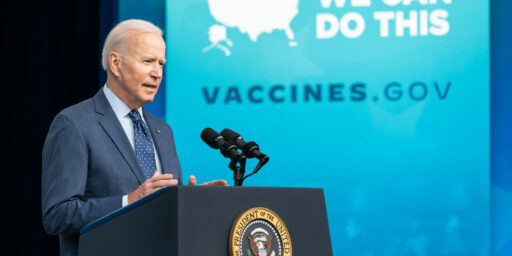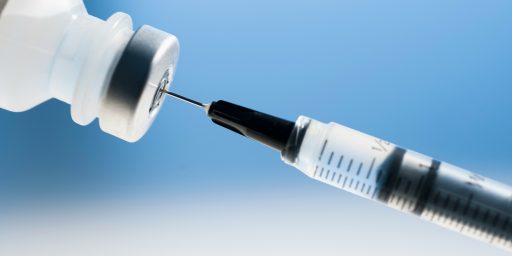Public Health vs ‘The Science’
The CDC is weighing changing the definition of "fully vaccinated."

NYT (“As Omicron Spreads, Officials Ponder What It Means to Be ‘Fully Vaccinated’“):
Goldman Sachs and Jeffries, the investment banks, are demanding that employees get booster shots. The University of Oregon and other institutions are requiring that students and staff members get boosters. New York State has said it plans to stop considering residents fully vaccinated unless they’ve gotten the shots.
As the highly transmissible Omicron variant spreads from coast to coast, corporations, schools, governments and even sports leagues are reconsidering what it means to be “fully vaccinated.”
Now federal health officials, too, have taken on the question. Although top policymakers want to encourage Americans to get three doses, some would like to avoid changing the definition of a phrase that has become pivotal to daily life in much of the country, according to officials who spoke on condition of anonymity to describe internal deliberations.
Dr. Rochelle P. Walensky, the C.D.C. director, said in an interview on Tuesday that she and other health officials were “working through that question” now.
“There really isn’t debate here in what people should do,” she added. “C.D.C. is crystal-clear on what people should do: If they’re eligible for a boost, they should get boosted.”
With Omicron’s sharp rise — more than 488,000 new cases were reported on Wednesday alone — some experts think the moment for change has arrived. “I think the time is now,” said Dr. Georges C. Benjamin, the executive director of the American Public Health Association. From a medical perspective, he said, receiving that additional booster dose “is really what we should be thinking of as fully vaccinated.”
Redefining “fully vaccinated” could lead to enormous logistical challenges, as even supporters of the idea concede, and it is likely to incite political backlash. Tens of millions of Americans who thought of themselves as vaccinated might discover that without boosters, they could lose access to restaurants, offices, concerts, events, gatherings — any place where proof of vaccination is required to enter.
Moreover, the change risks undermining trust in public health officials after two years of shifting recommendations, experts said. Some Americans may feel that the goal posts have been moved again, and too suddenly.
“While a determination of what constitutes full vaccination may be grounded in science, it does have significant political and economic ripple effects,” said Larry Levitt, the executive vice president of KFF, a nonprofit organization that focuses on health issues.
This reinforces several interrelated points I’ve been making since quite early in this pandemic.
First, while public policy in this area should be very much be grounded in “the science,” it can’t be made by scientists. While epidemiologists and other experts have expertise that needs to be folded into decisions, weighing the competing priorities involving such things as school and business closures, vaccine and mask mandates, and all manner of complicated choices that all carry substantial downside risk is ultimately the job of elected officials.
Second, this is all complicated by the very nature of science. We’ve known from the very beginning—two years ago now—that we were dealing with a “novel” coronavirus. By definition, that meant that our knowledge would evolve quickly but, alas, painfully as the disease spread and trial and error increased our information. Which, from a non-expert standpoint, means that the scientists will be “wrong” a lot in full view of the public. For the scientists, that’s completely normal. Best practices simply evolve as we know more. But, for the public, it comes across as the experts not knowing what they’re doing.
Third, and directly related to the first two, those in charge of health policy have to shade their recommendations with an eye to public opinion even if that means policies are suboptimal compared to the best scientific understanding. It does no good to issue edicts that aren’t going to be followed. And incentives matter.
I’ve supported the idea of vaccine passports because the small tradeoff in freedom of having to prove one’s vaccination status would encourage the hesitant to do what’s good for the public health while at the same time helping get economic and social activity back to normal. I was skeptical of the CDC decision that gave those who were vaccinated the green light to resume normal activity sans implementation of a passport system because it encouraged free riding.
It’s rather obvious at this point that being “fully vaccinated” means an mRNA booster on top of whatever initial regime one has had. My wife and I got ours soon after being eligible and our three over-18s will get theirs soon. (The 13-year-old isn’t eligible and the 10-year-old just received her second Pfizer jab yesterday.) Whether the negative externalities of being unboosted are sufficient to mandate boosters for most people is another story. And whether raising the bar from two shots to three will make it less likely that the hesitant but not defiant crowd will get their initial shots is another one.





If they haven’t gotten a shot by this point, should we really be basing any public policy on them? Shouldn’t we concede that unless we are willing to go to a full mandate, we haven’t discovered anything that will spur such people to get the jab?
(The above are really meant as questions, not statements)
And in case the situation could be more complex, Israel is experimentally giving a 4th dose as a booster. Would 3 still be considered fully vax’ed?
Read a twitter thread this morning on my coffee-and-news-cruise by our freq visitor Cheryl Rofer (so it must have been LGM, I guess) describing the policy discussion going on regarding mandatory vax’ing for airline travel. And why despite it being excellent health policy it is politically impossible.
Emphasized to me the importance of masking appropriately and really seriously avoiding crowded places. The science isn’t solid enough and the policies too intertwined with interests other than my precious health.
It’s a tough call and I don’t envy them. Does revising the definition secure or challenge the credibility of the definition?
In one of his memoirs, Asimov tells an anecdote where he explained to Robert Heinlein how he worked. After typing a story, he’d go over it and note typos and make revisions, then he’d type it again fixing errors and making revisions on the fly.
Heinlein asked him, “Why don’t you just get it right the first time?”
It’s even more so for something as complex as a new virus which has a strong tendency to mutate quickly. It takes time to study it, to learn how it spreads, and a whole lot more besides. Never mind how to treat it. Naturally health advice changes as new facts are discovered.
The two shot regime would have been plenty for the original strain and even some earlier variants, like Alpha. I mean not as far as preventing severe disease, this was a given, but in preventing infection and transmission. Delta and now Omicron have changed this.
People in essence are asking “Why didn’t they get it right the first time?” You know, before the variants evolved. State the question that way, and the answer is so obvious even a Republican could see it.
The reality is that covid is going to require an annual or perhaps even a bi-annual booster that keeps immunity levels up and provides protection from the virus’s variations and adaptions. That should be the message going forward, those attuned to protecting themselves will follow the vaccination regime, the rest ¯\_(ツ)_/¯ .
@Sleeping Dog:
It’s possible even an annual booster won’t be required.
By now it’s obvious we son’t stop transmission for two reasons: 1) too many people refuse to be vaccinated, and 2) they help breed new variants, some of which can defeat the protection against infection afforded by vaccines.
However, we’ve seen that even only two doses taken months previously still offer very good protection against severe disease and death. If such protection persists for years after, we may conclude this is good enough and not require yearly boosters once the pandemic burns out.
The urge for boosters and even a 4th dose right now, is to prevent infection and reinfection so the outbreak will end sooner. Me, I plan to take every dose that’s recommended, even if it means weekly shots for the next ten years (it won’t).
I may be wrong, and perhaps the trump virus’ propensity for mutation may mean boosters twice a year to prevent severe disease. It’s one of those things we’ll just have to live through first.
One thing is certain, masks will remain a necessity for a while yet, even if they’ve fallen out of fashion.
Has anyone else seen this from a week ago?
@Kathy:
Perhaps you’re right, but there was a hope that the initial round of vaccination, either one or two dose versions would provide longish term protection. We have seen that protection has diminished over time, a period as short as six months has shown degradation. We also now know that prior infection, doesn’t provide much immunity. Of course, covid, like all viruses mutates, so it is not unreasonable that covid-19 begins looking like the seasonal flu, for which there are annual vaccine updates.
In a more ideal vaccine scenario, a covid 19 vaccine would provide multi year protection similar to pneumonia vaccine and tetanus, but that doesn’t seem to be the case.
@Sleeping Dog: Hey, if I can avoid one or more deadly diseases by getting an annual shot that takes 2 minutes, we’ll, where do I sign up?
@Michael Reynolds:
I did. I think I mentioned it here. I hope it works as advertised.
@Sleeping Dog:
I think the diminished protection is against infection, not against severe disease. These are different things.
Since the vaccines have been in general use only a year, and since many will be taking boosters, measuring the duration of protection against severe disease will be problematic.
I wouldn’t mind taking a COVID vaccine every six months, or even every month, so long as the doses are available. But far more people than anti-vaxxers, politicized or not, will refuse frequent boosters, especially those who tend to have a reaction like fever or fatigue.
I mentioned the other day that some experts were predicting a low efficacy vaccine at the start of the pandemic, based on what was known about corona family viruses. At the time there were also indications that people who had recovered from SARS in 2003 (the now SARS-CoV-1 virus), eighteen years ago, had a better immune response to COVID. This would support long-term protection against severe disease.
A study out of South Africa indicates that two doses of the J&J vax are 85% effective against Omicron.
@Kathy:
I know that the importance of vaccine is preventing serious illness, with reducing infection a by-porduct. But the risk for serious illness varies greatly depending on the individual, which is why vaccines for pneumonia, the flu and shingles are strongly recommended for those over 65. So reduced effectiveness of covid vaccines in preventing infection, opens the door serious disease in parts of the population.
With Omicron having an R0 of about 10, and breakthrough infections, I honestly question what the point of a vaccine mandate is — we will be constantly exposed even if we had 90-95% vaccination. Less exposure is good, but we have to weigh the cost, and many of the unvaccinated will have some protection from prior infections.
If Omicron remains less deadly, and crowds out other variants, we could be reaching the point where we declare victory, count those not killed by Plain, Alpha and Delta as a win, and go on. Especially with the new antiviral treatments that will be ramping up production.
I’m short term pessimistic but medium term optimistic. And then long term pessimistic if we don’t start figuring out treatments for long Covid.
ETA: Not the ideal scenario, but some decisions have been taken out of our hands. This is an amazingly infectious disease.
@CSK: I suspect that over the long term the lesson of vaccination is what it has always been. Being vaccinated offers significant benefits over not having a vaccine available. As a long-term vaccination for allergies patient, I remember that it took about 30 or so years of weekly vaccinations to achieve any substantial reduction of my asthma and rhinitis symptoms. From what pulmonologists and allergy specialists tell me, the time frame has shrunk considerably (I would hope so!), but that it’s still a years-long process. I hope that’s not true for corona viruses, but it could be.
“With Omicron having an R0 of about 10”
That was the highest estimate I saw from anyone. Most people think R0 is between 3-5. Not clear yet how much less deadly it is, probably only 25%-50% as many deaths. If we get twice as many cases but it is 50% less deadly we still have a big surge. Best to be vaccinated. Still, it could sort fo vaccinate a lot of the unvaccinated making it much more difficult to have another surge.
Steve
@CSK:
You did indeed.
@Sleeping Dog:
We’re talking a bit past each other, I think.
the purpose of a vaccine is to keep you from getting sick. Unfortunately, not all vaccines can do this without a universal uptake. there are older vaccines, that offer lower protection from infection than the COVID vaccines did for the original strain, say like 80-85%, but they keep more people from getting sick because over 98% of the population takes them.
This is not going to happen with COVID, if current vaccine refusal trends continue (and keep in mind this happens in almost every country, and it’s not always politically motivated). To make up for the lack of her immunity, we’re using additional doses as boosters.
It may be that we will have to give up on being protected from infection, and settle for being protected from sever disease (and hopefully long COVID). If this protection lasts for he log term, boosters may not be necessary every year.
There are a lot of unknowns.
I’m just exhausted with the COVID-specific anti-vaxxers saying “boosters? So the vaccine doesn’t work!” when anyone could just pull up their own chart and see that they’ve had 7+ boosters for tetanus/diphtheria/pertussis.
@Crusty Dem: ….there’s also the “we don’t have a record of you getting vaccinated” and BAM you get another MMR shot mainly because you can’t get the relevant authorities to talk to each other. (I hate to think as to how many MMR shots I’ve had by now.)